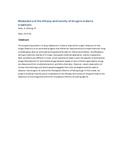| dc.contributor.author | Nzila, A | |
| dc.contributor.author | Chilengi, R | |
| dc.date.accessioned | 2013-06-27T13:59:55Z | |
| dc.date.available | 2013-06-27T13:59:55Z | |
| dc.date.issued | 2010-06 | |
| dc.identifier.citation | Nzila A, Chilengi ;Modulators of the efficacy and toxicity of drugs in malaria treatment,Trends Pharmacol Sci. 2010 Jun;31(6):277-83 | en |
| dc.identifier.uri | http://hinari-gw.who.int/whalecomwww.ncbi.nlm.nih.gov/whalecom0/pubmed/20381886 | |
| dc.identifier.uri | http://erepository.uonbi.ac.ke:8080/xmlui/handle/123456789/41259 | |
| dc.description.abstract | The burgeoning problem of drug resistance in malaria requires the urgent discovery of new drugs. Discovery of an antimalarial agent that fulfills the requirements of a mass-treatment drug is challenging. Such an antimalarial drug should be safe for infants and children, be efficacious during a treatment course of 3-5 days, have good intestinal absorption, and be inexpensive. Such conditions are difficult to meet, which explains (at least in part) the paucity of antimalarial drugs. Development of antimalarial drugs has been based on two orthodox approaches: drugs are discovered from medicinal plants or synthetic chemistry. However, recent observation of human chemotherapy and pharmacopeia suggests that other strategies could be used to discover new drugs or to extend the therapeutic lifetime of failing drugs. In this review, we present evidence that the use of modulators of the efficacy and toxicity of drugs will lead to the discovery of new drugs and extend the therapeutic lifetime of existing agents | en |
| dc.language.iso | en | en |
| dc.publisher | University of Nairobi, | en |
| dc.title | Modulators of the efficacy and toxicity of drugs in malaria treatment. | en |
| dc.type | Article | en |
| local.publisher | College of Health Sciences, | en |

